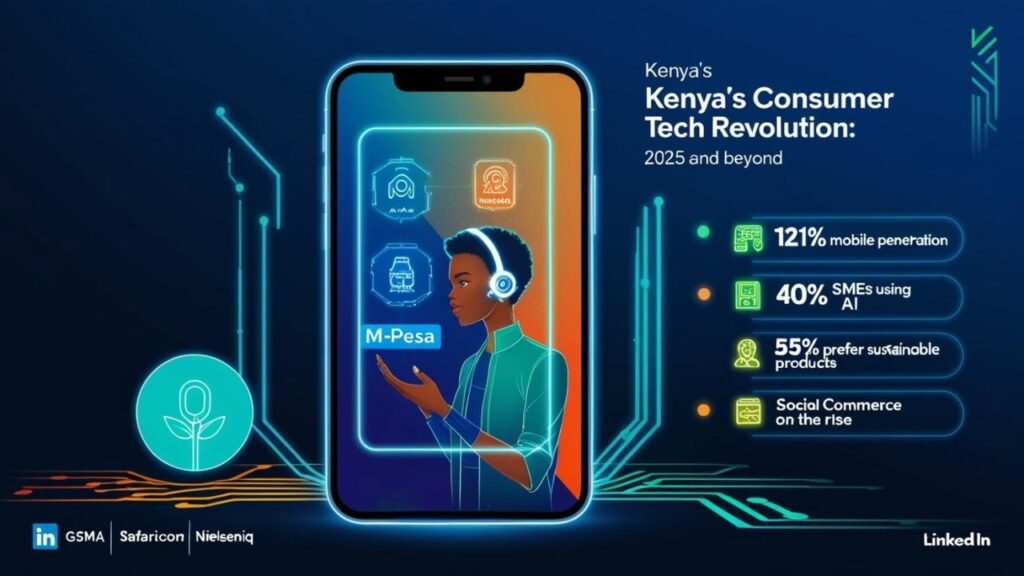Kenya’s Consumer Landscape 2025: Insights, Strategy, and Industry Leadership

Nairobi, August 2025 — Kenya’s consumer market is undergoing a transformative shift. The latest NielsenIQ East Africa Consumer Outlook reveals a dynamic interplay of economic recovery, cautious spending, brand switching, and rising digital influence. Paired with industry voices from leading marketing and retail innovators, the report paints a picture of a market rich in opportunity but demanding strategic precision.
Economic Growth and Consumer Mindset
Kenya’s GDP growth continues to outpace the Sub-Saharan Africa average, supported by a robust East African performance. FMCG value growth stands at 11%, largely inflation-driven, yet volume gains hint at improving consumer sentiment. However, 91% of Kenyans believe they are in a recession, a perception influencing spending habits across generations.
Gen X feels the pinch most, prioritizing essentials and bulk purchases, while Millennials show heightened price awareness. Across all demographics, the top concerns are rising food prices, economic downturn, and job security, setting a cautious tone for 2025.
Spending, Saving, and Switching
Consumers are shifting spend toward life essentials such as education, health, and groceries, while cutting back on discretionary categories like electronics, entertainment, and dining out. Brand loyalty is fragile: 66% of shoppers switched brands in the past year, with essentials like cooking oil, laundry products, and milk topping the list. High product quality and brand trust remain the strongest retention drivers, particularly among Millennials and Gen X.
Savings habits are also evolving. While banks remain dominant, mobile app-based savings solutions are surging in popularity among Gen Z, signaling a digital-first financial future.
Digital Influence and Social Commerce
The report underscores the growing role of social media in shaping purchase decisions. 20% of Kenyan consumers are influenced by social media, with TikTok emerging as the most powerful platform—especially among Gen Z and Millennials. Clothing and electronics dominate social commerce categories. Meanwhile, 35% of Kenyans shop online, though engagement levels among older consumers remain low.
Artificial Intelligence is also entering the retail conversation, with 11% of consumers—mostly younger—using AI tools to compare prices and research products.
Retail Channels and Local Preference
Traditional trade remains a cornerstone, commanding over 60% of FMCG volume. However, supermarkets are the preferred choice for younger shoppers. There is also a marked preference for local brands—89% of consumers favor them over international labels, a signal for both domestic and global players to localize offerings.
Sustainability and CSR
With 71% of Kenyans prioritizing eco-friendly or socially responsible brands, sustainability has shifted from a niche value to a competitive necessity. Innovation at the intersection of performance and environmental stewardship—such as durable, energy-efficient products—is poised to win market share.
Industry Voices Driving Change
The NielsenIQ panel brought together leaders shaping East Africa’s brand and retail future:
- Prudence Mutembei, Senior Brand Manager – Beers at KWAL (Heineken Beverages), is spearheading Heineken’s re-entry into Kenya, targeting vibrant young consumers and leveraging her track record in brand repositioning and innovation.
- Francis Karugah, Vice President at IndaHash, brings over a decade of transformative digital strategy experience, connecting global brands to consumers through influencer marketing at unprecedented scale.
- Willy Kimani, Founder of Jaza Discounter, is redefining retail efficiency through operational excellence, tech integration, and market intelligence drawn from retail best practices worldwide.
- Valyne Kinya, Communications Officer at EPROK, champions sustainability by leading campaigns on responsible e-waste management, marrying communications expertise with environmental impact.
Strategic Outlook for Brands
The 2025 Kenyan consumer market is not for the complacent. Success will belong to brands that can:
- Anchor trust in quality while adapting to price-sensitive shoppers.
- Leverage digital commerce and influencer ecosystems—especially on TikTok—to capture younger demographics.
- Embed sustainability into brand DNA, making it aspirational and accessible.
- Balance traditional retail dominance with modern trade innovation, ensuring omni-channel presence.
- Innovate in value delivery, from AI-powered shopping assistance to hyper-localized product development.
Kenya’s market in 2025 is one of resilience and reinvention—where informed strategy, cultural insight, and digital agility will separate market leaders from followers.


